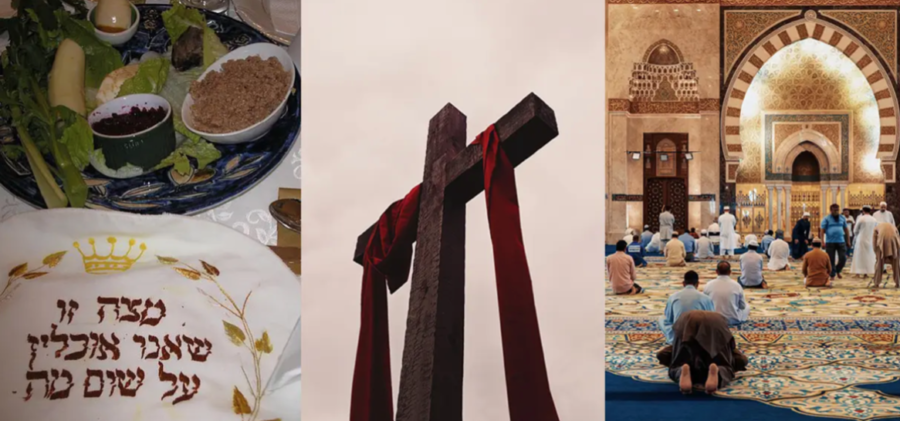Religion: About and Why Do We Play Favorites?
I am not religious. Despite not being religious, I experience interactions with religious beliefs and values constantly due to the religious significance many associate with around me or generally within society. Not only that, but religion shows up constantly within advertisements, articles, social media, and within the classroom at school. With around 85% of people in the world identifying with a religion according to World Population Review, religion has shown mass significance to people all around the world, hence why current religious holidays are so important to many and are very critical to people within these religions. Within this article I will discuss the recent religious holidays that are occurring and have occurred and their meaning. Along with these recent religious events and their significance, I will discuss why white Christianity is most often the only holiday in America associated with respectability within the masses and why this is a bigger issue than many consider.
Now again, I am not religious. But not being religious allows me to view religion from a critical point of openness and consider the imperative extent of religion. Due to this non-religious viewpoint, I am able to consider these religious values from a different angle and provide a non-religious view point on the current uprising problem of Christian holidays having no school while non-Christian holidays do not experiencing this luxury.
Without further ado, let’s discuss the recent religious holidays such as Ramadan within Islam, Passover within Judaism, and Easter within Christianity.
Ramadan:
Information from an article published by Vox, written by Jennifer Williams on April 8th, 2021, and titled “Ramadan: 9 questions about the Muslim holy month you were too embarrassed to ask
What is it?
Ramadan is the most sacred month of the year for Muslims and is a holiday celebrated within Islam. During this time, it is believed that God revealed the first verses of the Quran to Mohammed on a night known as the “Night of Power.” Within this month, Muslims across the world fast from dawn to sunset and is meant to be a time of spiritual discipline. This time is also meant for Muslims to focus on their relationship with God, experience intense study of the Quran, extra prayer, and increase generosity and charity. This month is largely meant to celebrate which can be shown within the three-day celebration of Eid al-Fitr or the festival of breaking the fast at the end of Ramadan.
How long does it last?
Ramadan lasts a month and this year spanned from (Friday) April 1 of to May 1 (Sunday) of 2022. Although, the dates of Ramadan change every year due its following of the lunar calendar or its basis on the phases of the moon. This calendar consists of 12 months but with a 354-day length. In relation to the traditional Gregorian calendar (which is 11 days longer), the Islam lunar calendar moves backward 11 days every year. This calendar can have an impact on the experience of fasting due to the months and seasons changing (the amount of time from sunset and dawn is different every year).
Why is it significant?
Ramadan is very significant for Muslims around the world and represents a time of reflection and growth. It is a time to spend with loved ones and to help those in need. Ramadan is very important to practice self-discipline, sacrifice, and empathy for those who are less fortunate (which encourages zakat or obligatory charity).
How does fasting work?
Fasting during Ramadan is one of the five pillars of Islam along with testimony of faith, prayer, charitable giving, and pilgrimage to Mecca. All Muslims are required to fast each year but there are exceptions for those who are ill, pregnant or nursing, menstruating, traveling, or young children or the elderly. Fasting during Ramadan is meant to represent one’s dependence to God for sustenance, to focus on one’s relationship with God, and to develop empathy for the poor. During this time, Muslims abstain from eating food, drinking any liquids, smoking cigarettes, or engaging in any sexual activity from dawn to sunset. Along with this, Muslims are supposed to decrease negative thoughts and abstain from cursing, gossiping, or complaining throughout the month. If fasting gets broken during the time between dawn and sunset, Muslims are encouraged to make up for the days they didn’t fast by either fasting later in the year or providing a meal to a needy person for each day missed.
How can you be respectful towards your Muslims friends during Ramadan?
- Abstain from eating in front of your Muslim friends who are fasting
- Don’t offer your Muslims friends a bite or a sip of your food or drink while they are fasting
- If having a dinner party or activity involving eating, try to hold it after sunset so your Muslim friends can eat as well
- Learn a standard greeting to say to your Muslim friends during Ramadan. Ex: “Ramadan Mubarak” (Blessed Ramadan or Happy Ramadan).
Passover (Pesach):
Information from an article published by Almanac on April 29, 2022 and titled “Passover 2022: When does Passover Begin”. Information from an article written by Emily VanSchmus on April 15th, 2022, published by Better Homes and Gardens, and titled “What Is Passover? Here’s What You Should Know About the Holiday”.
What is it?
Passover is religious holiday celebrated within Judaism. This holiday commemorates the story of Exodus which led to the birth of the Jewish nation, Israel. The holiday commemorates the emancipation of Jewish people from slavery (in ancient Egypt). In addition, it celebrates the fundamental principles found with Judaism like faith, prayer, deliverance, freedom, and service to God which all lie within this story. Once a year, Jews devote an entire week to recalling the event of the Exodus and growing and furthering their faith. To encourage this, Jews partake in a Passover meal known as the seder. At the meal, the Haggadah or prayer book is read as a series of rituals performed by Jewish families. The Haggadah contains the story of the biblical Exodus.
How long does it last?
This year Passover began on April 15 and ended on April 23. Passover lasts eight days and the dates are based on the Hebrew calendar. It lasts from the 15th day of the Hebrew month or Nissan until the 22nd day.
Where does Passover originate?
Passover originates from two ancient observances. As mentioned in the Torah, Nissan 14 was the Passover and at this time a sacrifice of lamb (killing and preparing) occurred in the afternoon as an offering to the lord. Nissan 15 was the beginning of the seven-day festival of Unleavened bread. The previously slaughtered lamb was eaten the night of Nissan 15 along with the Unleavened bread. This festival, over time became known as Passover and was said to start at sundown between Nissan 14 and 15.
Why is it significant?
Passover is significant due to its commemoration of the biblical story of the Exodus. Within the Exodus the story goes that Israelites were held as slaves within Egypt, but the Pharoah of Egypt refused to let them go. God inflicted the ten plagues of Egypt unto the land leading the Pharoah to call on Moses to free the Israelites from slavery and allow them to freely practice their religion. This freeing imposes the “passing over” or infliction of safety of the Jews, which signifies the name. This story tells of the protection towards the Jews and allowing of faith to carry on God inflicted on them.
Good Friday/Easter:
Information from an article published by Askany Difference and titled “Difference Between Good Friday and Easter Monday (With Table)”. Information from an article written by Justin Holcomb on February 17, 2022, published by Christianity.com, and titled “What’s So Good about Good Friday”.
What is it?
Good Friday and Easter are holidays within Christianity that reflect on the crucifixion, death, and resurrection of Jesus Christ. This holiday (Easter Monday) is a time for Christians to celebrate the gift of eternal salvation. Good Friday is the day before Easter and in earlier times of Christianity, was viewed as a day of sorrow, penance, and fasting. Good Friday is meant to be a day where Christians remember the day Jesus willingly suffered and died as the ultimate sacrifice for our (what Christians believe is the general population) sins. Easter Sunday is the day that Jesus was resurrected while Easter Monday denotes the victory of life over death.
How long does it last?
Good Friday itself lasts three days and begins at noon and lasts until 3 PM. Good Friday occurs two days before Easter Sunday while the entire holiday lasts three days. Easter is celebrated on the first Sunday after Paschal Full Moon while Good Friday occurs on the Friday before Easter Sunday. All these dates follow the Church’s lunar calendar.
Good Friday vs Easter:
- Good Friday is the day when Jesus Christ was Crucified; Easter Monday is the day after East Sunday where it is believed Jesus Christ was restored/resurrected.
- Good Friday signifies the sacrifice Jesus Christ made for Christians; Easter Monday signifies the victory of life over death.
- Good Friday signifies pain and sorrow; Easter Monday signifies celebration.
- Good Friday is often considered a holiday in most countries; Easter Monday is not.
Why is it significant?
This day is significant for Christians to commemorate Jesus Christ’s crucifixion.
The Gap Between Christianity and Everything Else in America:
Information from an article published by Black Youth Project, written on February 18, 2018, and titled “How “Christianity is the white man’s religion” feeds the damaging disconnect between the Diaspora and Africa”. Information from an article published by SBU Brooklogue on August 13th, 2020, and titled “Less School, More Education: Religious Holidays in American Public School”. Information from an article published by Pew Research on January 4th, 2021, and titled “Faith on the Hill”. Information from an article published by Pew Research on January 28th, 2021, written by Katherine Schaeffer, and titled “Racial, ethnic diversity increases yet again with the 117th Congress”.
Now that we know a little bit more about the significance and importance of these holidays, it’s time to ask the question: why is it that only one gets more attention and recognition?
What am I talking about?
I am talking about the favoritism that the U.S. (and other predominantly white countries) shows towards the version of white Christianity. When I say “favoritism” I mean respectability. Within the U.S., Christianity has been long prevailing within the number of followers it has. But with strides in religious diversity occurring, why does white Christianity still seem to be the only religion many view as esteemed? Well, this is largely due to race, xenophobia, and the United States’ ties within church and state.
Despite African Americans large role in contributing to the furtherment of early Christianity, a large majority of the association with the expression of Christianity in the U.S. stems from its roots in white supremacy (on top of it being used to enforce segregation during the Jim Crow era). This association with Christianity and white people in the U.S. has long prevailed in the minds of many despite the number of white Christians declining and the deep roots of Black people within the building of Christianity. This consistent association with white people and Christianity forces other religions within the U.S. that aren’t typically associated with white, to be less recognized and less respected. The deep roots of white Christianity within the United States history has caused many to be unaccepting towards other religions, especially majority non-white religions. On top of this, many of the ties within the government and white Christianity have yet to subside. Nearly 88% of congress according to a study done by Pew Research is Christian and 77% of congress members are white. Not only are the ties between white Christianity within the government still constant, but the push to make the U.S. a Christian nation doesn’t stop. Much of what is viewed as respectable within this country is associated with the government. When this much of congress consists of white Christians (and the United States past with white Christian presidents), the laws and association with respectability are tied to white Christianity. What this really means is that upcoming risings in religions that don’t consist of white Christianity and especially non-white religious increases, are not respected.
Why is this concerning?
Besides the implications of homophobia and racism ingrained within this country through white Christianity, I really wanted to talk about the implications this has on modern day non-Christian students. Due to the majority upbringing of white Christianity within the US, the only religious related days off school students exhibit are for Christian holidays. But how is this country supposed to be founded on the prospect of freedom of religion when schools don’t even allow students to freely practice due to them having to be at school? This question is not one I can answer because it is not possible. The implications of only Christian holidays being off days for students not only suppresses non-Christian holidays but encourages the practice of Christianity itself. Students that engage in holidays like Ramadan and Passover are not getting the same level of equality in terms of off days as Christians due. This disparity forces these students to pick between school and religion, a decision a child should never have to make. Not only does this negatively impact many non-white students and non-Christian students, but it decreases the prospects of religious respectability and tolerance within students and people, encouraging a closed mindset.
How can we fix this inequality?
Essentially, it’s either all or nothing. Schools have two choices in order to limit this inequality: it’s either find a way to incorporate all majorly practiced religious holidays within the US on the academic calendar, or not take any days off for any religious holidays. The first option really isn’t the best considering it still doesn’t allow students to take leave on their important ceremonial days and ignores the disparity between white-Christian holidays and non-Christian holidays. The option of incorporating more diverse religious holidays on the calendar is the best and most sensible option. Despite seeming difficult or appearing to lose finances due to lost schooling days, the importance of fostering religious tolerance is more beneficial. Additionally, having to hire a substitute teacher to fill on days where the academic calendar does not accommodate for religious holidays, is even more costly. While achieving the ultimate goal of having most major religious holidays on the academic calendar for students to freely participate in and avoid the school vs religion roadblock might take some time, starting education within classrooms now is timeless. Increasing the knowledge of religions outside of white Christianity can also encourage the religious tolerance and fuel a more educated environment. Modern religion being taught in classrooms is not only key to decrease violence against non-Christian citizens, but to increase the prospect of religious tolerance and encouraging equality within religious accommodation.
Essentially, modern religious education starts now along with the celebration of Easter, a Christian holiday, Passover a Jewish holiday, and Ramadan an Islamic holiday.
Your donation will support the student journalists of Mounds Park Academy. Your contribution will allow us to purchase equipment and cover our annual website hosting costs.











